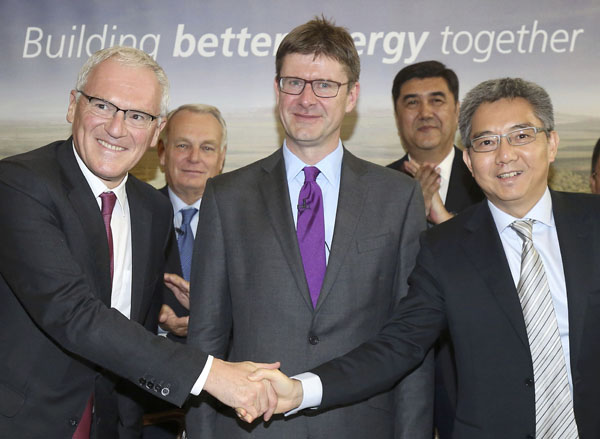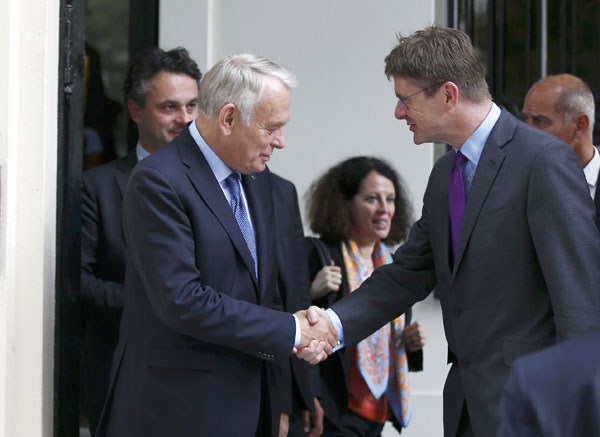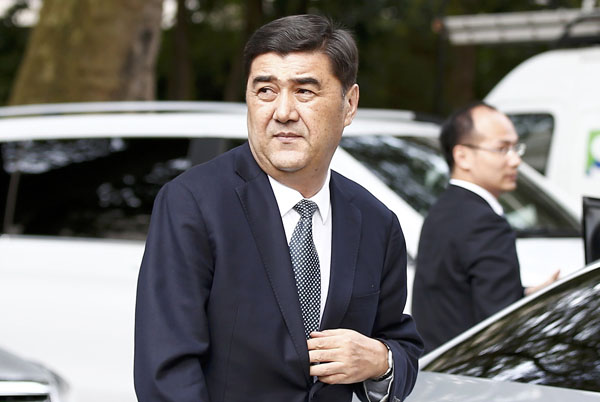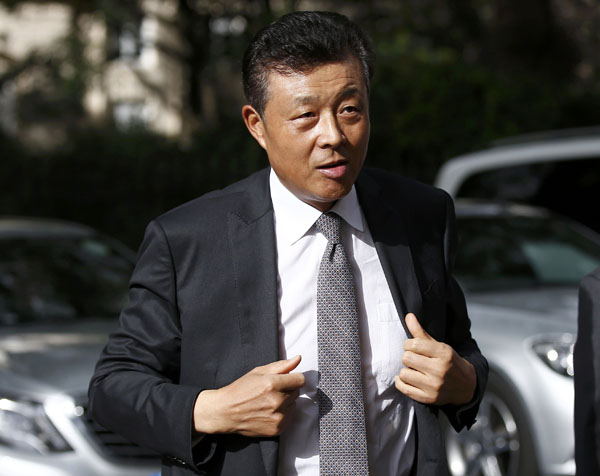China to seek UK approval of nuclear technology after Hinkley is signed
Updated: 2016-09-29 23:05
By Chris Peterson and Cecily Liu in London(chinadaily.com.cn)
|
|||||||||
Power plant design would get boost from Britain's stringent approval process
 |
|
(L-R) Jean-Bernard Levy chairman of EDF Group, French Foreign Minister Jean-Marc Ayrault, Greg Clark Secretary of State for Business, Chinese Energy Minister Neur Bekri and Energy and Industrial Strategy and He Yu chairman of CGN at a signing ceremony in London to finalise the deal to build Hinkley Point, the first new UK nuclear power station in a generation, September 29, 2016. [Photo by Philip Toscano/Reuters] |
China will submit its indigenous nuclear technology to the United Kingdom government's rigorous assessment program with a view to getting approval in five years — and to use it to build a power station at Bradwell, on the English east coast.
The announcement by China General Nuclear Corp Chairman He Yu was made on Thursday.
It came just after CGN, the French utility EDF and the UK government signed a final agreement on another project that is earlier in the pipeline, the UK's 18 billion pound ($23.4 billion) Hinkley Point power plant, giving it the definitive green light. CGN will finance one-third of that investment.
 |
|
France's Foreign Minister Jean-Marc Ayrault (L) shakes hands with Greg Clark Britain's Secretary of State for Business outside 10 Carlton House Terrace in central London, where representatives from Britain, China, France and energy company EDF signed an agreement to build and operate a new nuclear power station at Hinkley Point, Britain, September 29, 2016. [Photo by Peter Nicholls/Reuters] |
The Hinkley Point project is seen as a gateway for plans to introduce Chinese nuclear technology.
If Chinese technology passes GDA assessment, then Bradwell plant could be the first nuclear project in a developed market to use a Chinese design.
As a part of the contracts signed on Thursday, CGN and EDF would also jointly invest in Sizewell and Bradwell, proposed UK nuclear projects. CGN would be the majority shareholder in Bradwell, which plans to use China's third generation nuclear technology Hualong One.
Being the majority investor in Bradwell, with a 66.5 percent share, means CGN will bear responsibility for the project and its financial returns will be higher, He said.
 |
|
Nuer Bekri, China's Director of National Energy Administration arrives outside 10 Carlton House Terrace in central London, where representatives from Britain, China, France and energy company EDF will sign an agreement to build and operate a new nuclear power station at Hinkley Point, Britain, September 29, 2016. [Photo by Peter Nicholls/Reuters] |
Greg Clark, Secretary of State for Business, Energy and Industrial Strategy, said in a brief statement:
"Signing the Contract for Difference for Hinkley Point C is a crucial moment in the UK’s first new nuclear power station for a generation and follows new measures put in place by Government to strengthen security and ownership.
"Britain needs to upgrade its supplies of energy, and we have always been clear that nuclear power stations like Hinkley play an important part in ensuring our future low-carbon energy security."
Liu Xiaioming, China's ambassador to the UK, said Hinkley Point is a flagship product for UK-China cooperation, and is the "golden fruit" that confirms the golden era of China-UK cooperation.
The UK's General Design Assessment, which determines if a new nuclear technology can be used in the UK, is known to be the world's most rigorous. Currently only France's European Pressurized Reactor design has GDA approval. The US' AP1000 technology is still pending GDA approval. France's EPR model is being used for Hinkley Point.
"Once Hualong One passes GDA, it will boost more countries' confidence and push forward Hualong One's global market development," He said.
The ambassador said: "We are hopeful that China’s own technology, Hualong One, will pass GDA. That will signify China's nuclear power has really gone global."
Bradwell's technology will be modeled on Hualong One technology deployed at Guangxi Fangchenggang Phase II power station.
CGN established a GDA project department in February 2015 to work on the regulatory process; technical preparation for the GDA assessment process was completed by this July.
 |
|
China's ambassador to Britain Liu Xiaoming arrives at 10 Carlton House Terrace in central London, where representatives from Britain, China, France and energy company EDF will sign an agreement to build and operate a new nuclear power station at Hinkley Point, Britain, September 29, 2016. [Photo by Peter Nicholls/Reuters] |
The new UK government, led by Prime Minister Theresa May, took all sides by surprise in July when she said she needed more time to assess the project. Approval came two weeks ago, with the extra condition that Hinkley and other foreign-funded nuclear plants cannot change hands without the government's agreement.
An EDF board meeting on Sept 27 confirmed that EDF is happy with the extra condition.
Hinkley will begin construction in 2019 with a view to start operating in 2025. It will satisfy 7 percent of the UK's energy needs.
Lady Barbara Judge, former chairwoman of UK Atomic Energy Authority, said China has good technical nuclear capabilities. "I have great respect for the nuclear projects all over China," she said.
Andrew Shepherd, senior energy and infrastructure analyst at BMI Research, said "rigorous and robust assessment of China's own domestically designed reactor by UK regulators would certainly give China's nuclear export plans a significant boost."
He said CGN will increase efforts to communicate with greater emphasis on "transparency" with the UK public about its technology in order to build trust.
He said CGN is currently in advanced stages of preparing nuclear investments in Romania. Other areas being considered include the Czech Republic, Southeast Asian countries, South Africa, and Turkey.
Contact the writer at cecily.liu@mail.chinadailyuk.com
Related Stories
Visitors return to old nuclear facility 2016-09-28 08:01
Steady progress pledged on UK nuclear plant project 2016-09-25 13:30
China, France pledge to promote Hinkley Point nuclear power program 2016-09-21 17:25
China, UK to steadily construct nuclear power plant 2016-09-21 17:02
Today's Top News
Joint missile defense drill set for 2017
Snowden appeals extradition lawsuit
Samsung may permanently halt Galaxy Note 7 sales
Turkey, Russia sign deal on natural gas project
Trump goes on offensive, but Clinton more eloquent
China, Portugal pledge to upgrade cooperation
France angry with Poland after it scraps Airbus deal
Pound plunges 6% in Asian trade on Brexit fear
Hot Topics
Lunar probe , China growth forecasts, Emission rules get tougher, China seen through 'colored lens', International board,
Editor's Picks

|

|

|

|

|

|







